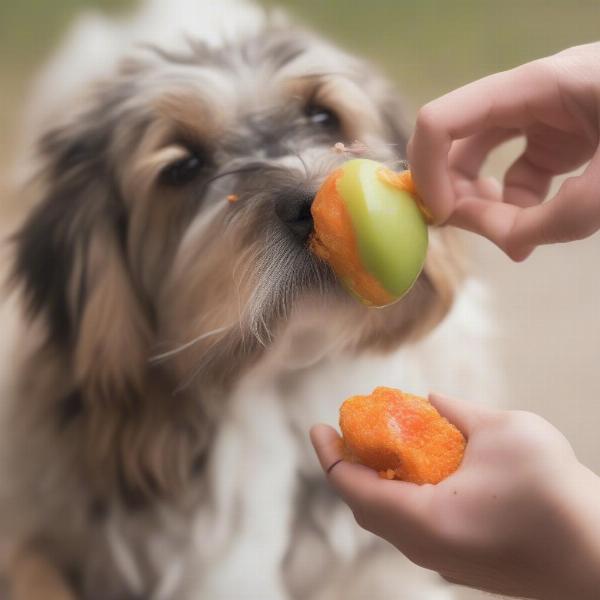Fly eggs, more commonly known as maggots in their larval stage, can sometimes be a tempting snack for dogs, especially those with a penchant for scavenging. While the occasional ingestion of a few fly eggs is unlikely to cause serious harm, it’s a habit that dog owners should discourage. This article explores the potential risks associated with dog eating fly eggs and provides practical advice on how to prevent this behavior.
Understanding the Risks of Dogs Consuming Fly Eggs
While a few fly eggs might not be immediately harmful, a large infestation of maggots in decaying food can pose several health risks. These risks include bacterial infections, parasitic infestations, and gastrointestinal upset.
Bacterial Infections
Fly eggs are often found in unsanitary environments, making them carriers of harmful bacteria such as Salmonella and E. coli. Ingesting these bacteria can lead to vomiting, diarrhea, fever, and even more severe illnesses. Puppies and dogs with weakened immune systems are particularly vulnerable.
Parasitic Infestations
Some types of flies carry parasites that can be transmitted to dogs through ingestion of their eggs. These parasites can cause a range of health issues, depending on the specific type.
Gastrointestinal Upset
Even if the fly eggs don’t carry harmful bacteria or parasites, they can still irritate a dog’s digestive system, leading to vomiting and diarrhea. This is especially true if the dog ingests a large number of eggs.
“Preventing your dog from accessing fly eggs is the best way to protect them from potential harm,” advises Dr. Emily Carter, DVM, a veterinary specialist in canine internal medicine. “Keeping your home and yard clean and free of decaying organic matter is crucial.”
How to Prevent Your Dog from Eating Fly Eggs
Preventing your dog from eating fly eggs involves a combination of environmental management and behavioral training.
Environmental Control
- Proper Garbage Disposal: Ensure garbage bins are tightly sealed and regularly emptied.
- Yard Cleanliness: Regularly clean up dog feces, fallen fruit, and other organic debris in your yard.
- Compost Management: If you compost, ensure it is properly maintained and inaccessible to your dog.
Behavioral Modification
- “Leave It” Command: Teach your dog a reliable “leave it” command to prevent them from investigating and consuming undesirable items.
- Muzzle Training: In cases where a dog has a strong scavenging drive, muzzle training can be a helpful tool to prevent ingestion of harmful substances.
- Positive Reinforcement: Reward your dog for ignoring fly eggs and other unsanitary items.
 Training a dog not to eat fly eggs
Training a dog not to eat fly eggs
“Consistent training and environmental management are essential for successfully breaking this habit,” adds Dr. Carter. “If your dog continues to eat fly eggs despite your efforts, consult a veterinarian or a certified dog trainer for further guidance.”
What to Do if Your Dog Eats Fly Eggs
If your dog eats fly eggs, monitor them closely for any signs of illness, such as vomiting, diarrhea, lethargy, or loss of appetite. If you notice any of these symptoms, contact your veterinarian immediately.
Conclusion
While the occasional ingestion of a few fly eggs may not cause significant harm, it’s important to prevent your dog from developing a habit of eating them. By maintaining a clean environment and implementing effective training techniques, you can protect your dog from the potential health risks associated with consuming fly eggs. dog eats fly eggs Remember, proactive prevention is always the best approach to safeguarding your dog’s health and well-being.
FAQ
- Are fly eggs toxic to dogs? While a few fly eggs aren’t inherently toxic, the bacteria and parasites they can carry can be harmful.
- What are the signs of a bacterial infection in dogs? Vomiting, diarrhea, fever, lethargy, and loss of appetite are common signs of a bacterial infection.
- Can I use home remedies to treat my dog if they eat fly eggs? No, it’s best to consult a veterinarian for appropriate treatment.
- How can I teach my dog the “leave it” command? Start by holding a treat in your closed fist. When your dog tries to get the treat, say “leave it.” Once they stop trying, open your hand and give them the treat.
- Is it safe to compost if I have a dog? Yes, but ensure the compost bin is inaccessible to your dog.
- What should I do if I see maggots in my dog’s food? Discard the contaminated food immediately and thoroughly clean the food bowl. maggot killer spray for dogs
- How often should I clean my yard to prevent fly eggs? Regularly clean up dog feces and other organic debris, especially during warmer months.
ILM Dog is your trusted international resource for all things dog-related. We offer expert advice on dog breeds, health, training, nutrition, grooming, and much more. Whether you’re a new dog owner or a seasoned pro, ILM Dog provides practical and reliable information to help you provide the best possible care for your canine companion. Contact us at [email protected] or +44 20-3965-8624 for personalized guidance from our team of experts. We specialize in providing comprehensive guidance on everything from selecting the right breed to ensuring your dog’s long-term health and well-being. Visit ILM Dog today!